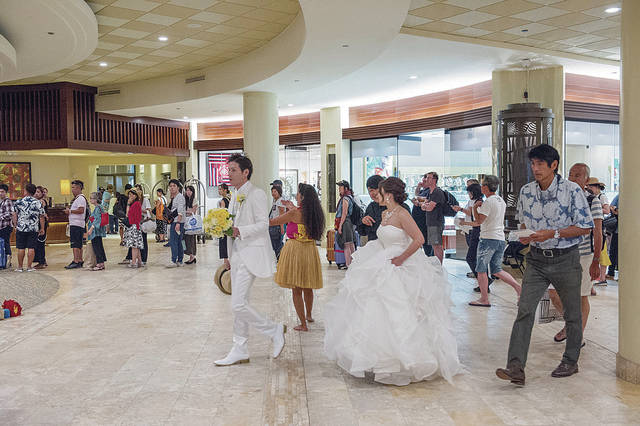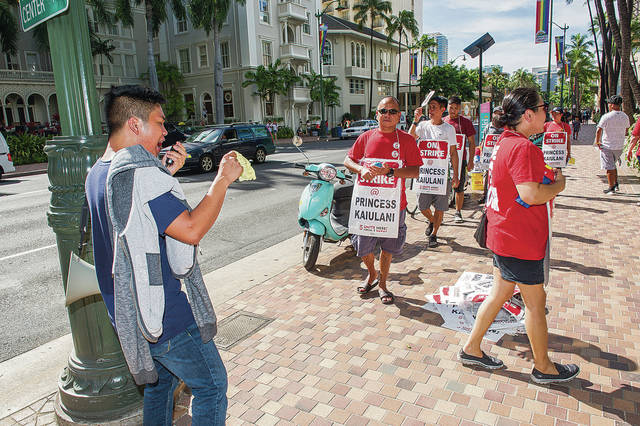-

CRAIG T. KOJIMA / CKOJIMA@STARADVERTISER.COM
A bridal couple made their way past a long line of arriving hotel guests at the Sheraton Waikiki on Tuesday. The 2,700 members of the Unite Here Local 5 union in Honolulu and on Maui are on strike, affecting service for guests at five hotels operated by Marriott and owned by Kyo-ya Hotels & Resorts.
-

CRAIG T. KOJIMA / CKOJIMA@STARADVERTISER.COM
Employees of the Sheraton Princess Kaiulani hotel picketed on the sidewalk along Kalakaua Avenue in Waikiki Tuesday. It was the second day of the hotel workers’ strike. Pickets were also going on at Sheraton Waikiki, The Royal Hawaiian, Westin Moana Surfrider and Sheraton Maui.
Unions representing sheet metal workers, flight attendants and public service employees took steps Tuesday to support the 2,700 Marriott hotel workers in Hawaii who were on their second day of a strike for higher wages and better benefits.
United Airlines’ flight crew checked out of the Sheraton Princess Kaiulani. United Public Workers pulled members out of a safety conference at the Sheraton Waikiki. The Hawaii Sheet Metal Workers Union checked out of 100 rooms that were booked for a week at Sheraton Maui, according to Paola Rodelas, spokeswoman for Unite Here Local 5, which represents the hotel workers.
“We support the strike 100 percent,” said Sara Nelson, international president of the Association of Flight Attendants, which represents 50,000 flight attendants at 20 airlines. “We will not cross the picket line and our contract protects that right. There are hundreds of flight attendant crew rooms each night in Honolulu. We encourage Marriott to get serious at the table and negotiate a contract (with) jobs that are safe and enough to live on.”
The five properties are owned by Kyo-ya Hotels & Resorts and operated by Marriott. Kyo-ya declined to comment on the strike Tuesday. On Monday, the company said it was committed to negotiating in good faith and hoped to resolve the situation in a timely manner. The union said no talks are scheduled.
In a letter to guests, Sheraton Princess Kaiulani said it had temporarily stopped housekeeping and pool services. It had limited telephone, engineering and bell services. Guests were instructed to pick up their in-room amenities at a table in the lobby. All restaurants and in-room dining were closed until further notice.
Guests at the Westin Moana Surfrider were told that there would be no valet service. Luggage and housekeeping services would be limited. They could pick up their own fresh towels and linens, bath and in-room amenities on select floors. The Beach Bar, Surfrider Cafe and in-room dining were closed until further notice and some other restaurant hours were adjusted.
Sheraton Maui limited housekeeping service, stopped in-room dining, and closed some food and beverage outlets.
The strike adds one more challenge to the state’s tourism industry, which already has had to deal with floods, a volcanic eruption and hurricanes.
The state Department of Business Economic Development & Tourism’s third-quarter 2018 forecast anticipated visitor arrivals by year’s end would rise above 9.9 million arrivals, up more than 6 percent from 2017. DBEDT also forecast visitor spending to grow to $18.4 billion, a more than 9 percent year-over-year gain.
If correct, Hawaii would achieve its seventh consecutive record-setting year in tourism.
That’s one of the issues at the heart of the hotel workers strike. Given the strong years hotels have been having, the workers are asking for more pay, more job security and safer working conditions.
The average Local 5 housekeeper makes roughly $22 an hour in a state where the National Low Income Housing Coalition estimates that it takes more than $35 an hour to afford to rent a two-bedroom apartment.
The hotel workers say they hope to keep adequate pension and health funds and to start a fund to make housing more affordable.
Janal Kaina, who is a restaurant hostess at The Royal Hawaiian, where she has worked for 33 years, said Tuesday that she was picketing because workers want their fair share of Hawaii hotel profits.
“The rich keep getting richer and getting all the breaks. We want to bring… working-class people up. We want everyone to have a better quality of life,” Kaina said.
Jan Hunnicutt, a visitor from Cedartown, Ga., said Tuesday that she sympathized with these union goals even though union chanting had disrupted her sleep.
“I have to work one job to pay for what I do. I’m sympathetic to someone who has to work two or three jobs to get by,” Hunnicutt said. “As far as protests go, this is the most peaceful one that I’ve ever seen. It’s not disturbing my vacation.”
But honeymooner Andrea Caldwell of Atlanta, a guest at the Sheraton Waikiki, said she was directly affected by the strike, which caused her to have to restock her towels and take out her own trash.
“This hotel was too much money per night to pick up my own towels and trash. If I wanted that, I could have stayed at the La Quinta. They need to pay these people and fix this already,” Caldwell said. “If I had known the property was on strike, obviously I wouldn’t have booked it.”
While it’s too early to say how much the strike will dampen Hawaii tourism, it’s already cost the state some business.
Jack Richards, president and CEO of Pleasant Holidays LLC, said there have been complaints from some of the several hundred Pleasant Holidays guests that are staying at the five hotels and there have been calls from people planning future vacations.
“We started getting calls the minute it happened because it’s disrupting customer service — there are picket lines and limited service at the affected hotels,” Richards said. “When people spend a lot of money to go on a dream vacation, they don’t want it disturbed.”
Hawaii doesn’t have a history of long hotel strikes, but its worrisome that the current one is tied to local and national agendas, said Keith Vieira, principal of KV & Associates, Hospitality Consulting, who was formerly a top executive at Starwood Hotels & Resorts, which once managed the Kyo-ya properties.
Vieira remembers a 1990 hotel strike, which involved 11 properties and 7,500 workers, lasted about 20 days. A 1970 strike on the neighbor islands, involving about 2,000 hotel workers, took about 10 weeks to resolve. Both of these strikes, which dampened tourism, prompted gubernatorial monitoring— the 1970 one from former Hawaii Gov. John A. Burns and the 1990 strike from former Hawaii Gov. John Waihee.
“The longer this one goes on, the more damage we will have,” Vieira said. “It’s likely to have an impact on future bookings, especially groups that are looking to close on a location in the next few months.”

Spread the word